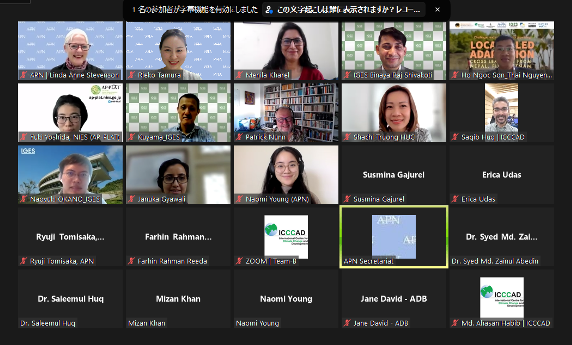13 March 2023 — APN and the Institute for Global Environmental Strategies (IGES) jointly organised a session titled “Challenges and opportunities for promoting locally-led adaptation: cross-learning from Nepal, Fiji, Vietnam” at the Gobeshona Global Conference 3 on 13 March 2023. The session comprised audience engagement with Mentimeter, presentations on the model case sites and tools for local-scale adaptation planning, and breakout sessions responding to key questions.
Speakers and panellists:
- Dr Linda Anne Stevenson, APN
- Ms Rieko Tamura, APN
- Mr Ryuji Tomisaka, APN
- Mr Tetsuo Kuyama, IGES Regional Center in Bangkok
- Dr Binaya Shivakoti, IGES
- Prof. Patrick Nunn, University of the Sunshine Coast, Australia
- Dr Yuki Yoshida, National Institute for Environmental Studies, Japan
- Dr Chi Huyen Truong, International Centre for Integrated Mountain Development, Nepal
- Ms Menila Kharel, Practical Action, Nepal
- Prof. Ho Ngoc Son, Thai Nguyen University of Agriculture and Forestry, Vietnam
Session summary:
This session discussed the importance of locally-led adaptation (LLA) and introduced the progress of a joint project implemented by APN and IGES on LLA in local communities in Fiji, Nepal and Vietnam. The representatives from each case study site presented their respective sites in geographic and socioeconomic contexts, and adaptation challenges and opportunities. Additionally, the session introduced the Asia-Pacific Climate Change Adaptation Information Platform (AP-PLAT), which offers tools for local-scale adaptation planning to address challenges such as lack of data, resources and capacity.
After the presentations, the participants joined two breakout groups and discussed the following questions:
- How relevant are the eight LLA principles in the context you are working or familiar with?
- What are the potential uses of the eight LLA principles for planning locally-led adaptation?
- In addition to regional platforms like AP-PLAT, how can we promote innovation for adaptation at the local level that fully engages indigenous, traditional and local knowledge systems (ITLK)?
The participants actively joined the discussion and shared their ideas on the importance of LLA in responding to structural inequality and enhancing local capacity to adapt to climate change impacts. The participants also shared the challenges and difficulties in implementing LLA projects.
Key takeaways from the end of the session:
- The existing structure of inequality affects how climate change and disasters impact local communities. Meeting the needs of the most marginalised groups is key to successfully adapting to climate change. In this context, gender-responsive approaches are also crucial.
- Local communities are knowledge holders and producers. Thanks to the recent promotion of action research in the field of climate change adaptation, there is an emerging co-production of knowledge by local people and scientists. There is a need to integrate different kinds of knowledge to realise LLA.
- Stresses that are felt in local contexts are not limited to climate risks. For example, the Pacific Islands face risks of tsunamis triggered by earthquakes and infectious diseases such as COVID-19. In responding to these complex challenges, a crucial approach is to strengthen local adaptive capacities. Donors and funders must design their projects incorporating the eight LLA principles to enhance local capabilities.



